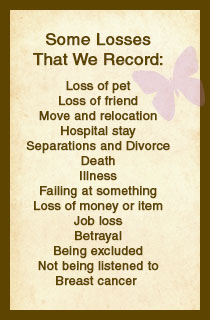- Perhaps it was not safe to express sorrow; maybe someone told them to stop crying
- Often the person was so young they truly had no say in situations such as a move/relocation, a new school, a loss of a pet, a sibling’s death
- Maybe there was not enough time to address the grief or loss
 A technique I use successfully when I suspect a client has unresolved grief incorporates a timeline and debriefing strategies. To begin the work, I have the client recall their first memories of any loss in childhood and try to establish an approximate age and date. The incident, date and their age are indicated on the timeline with a cross (e.g. they may say “I remember losing my dog when I was five and the year was 1972”).
A technique I use successfully when I suspect a client has unresolved grief incorporates a timeline and debriefing strategies. To begin the work, I have the client recall their first memories of any loss in childhood and try to establish an approximate age and date. The incident, date and their age are indicated on the timeline with a cross (e.g. they may say “I remember losing my dog when I was five and the year was 1972”).
As the timeline progresses to date, the many crosses with identifying age, date and issue gives me a starting point for the debriefing process:
- The recording process itself validates why they are depressed, confused, tearful or unsure of the future.
- We discuss how the avoidance of grief has affected their lives.
- We examine each cross on the timeline and discuss/debrief using a time-tested formula of the stages of grief, the four ways grief affects us, storytelling and pictures. I will often use the “empty chair” technique so my client can direct their expressions of loss toward the empty chair that represents a person or an experience. This frees them to give their grief a voice and to say what he/she never said at the time.
Other techniques I have used are:
- Grave visiting.
- Releasing of a small object such as a ring or watch into a river or lake.
- Letter writing.
- Building a memorial of rocks with the grief written on the back of the rock (e.g. first pet, divorce, lost job). One client has given permission for me to build a memorial in my patio garden for all to see. As we work through his list of sorrows and losses, the memorial takes shape.
The important thing to remember is that every individual’s processing of grief is unique. There is no timetable. The depth of their grief depends on the importance they attached to the loss, the closeness of the connection, the length of time it lasted, the amount of support they felt they had at the time of the loss, and their personal coping skills and inner resources.
Any feeling of loss you have reflects something that meant very much to you. The healing process requires time, work and pain. I love and admire my clients so much for being willing to do the hard work of getting better and knowing a new freedom from pain and inner demons. It continues to be my privilege and honor to walk people through this process to freedom.
God’s blessings and peace to you!
“We are hard pressed on every side, but not crushed; perplexed, but not in despair; persecuted, but not abandoned; struck down, but not destroyed.”
2 Corinthians 4:8-9